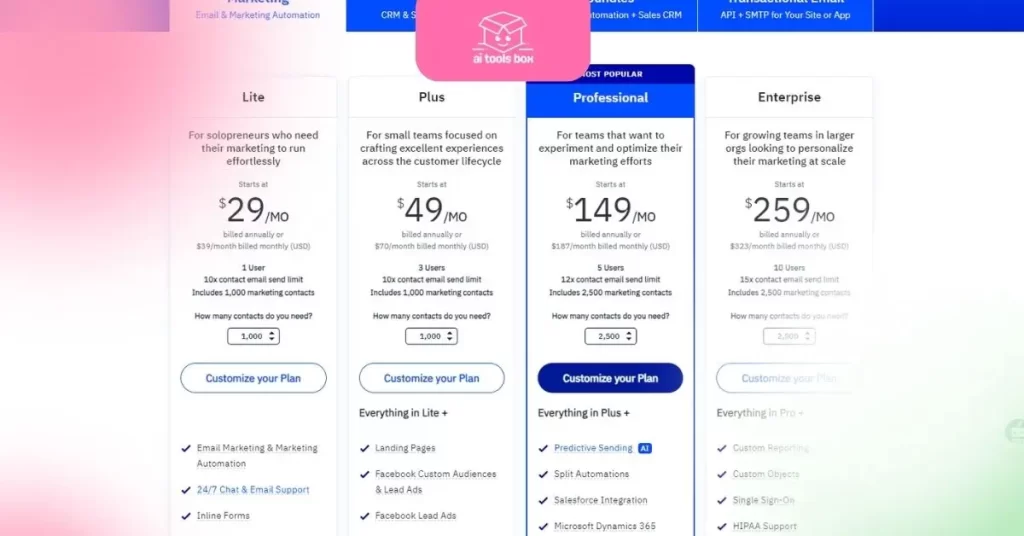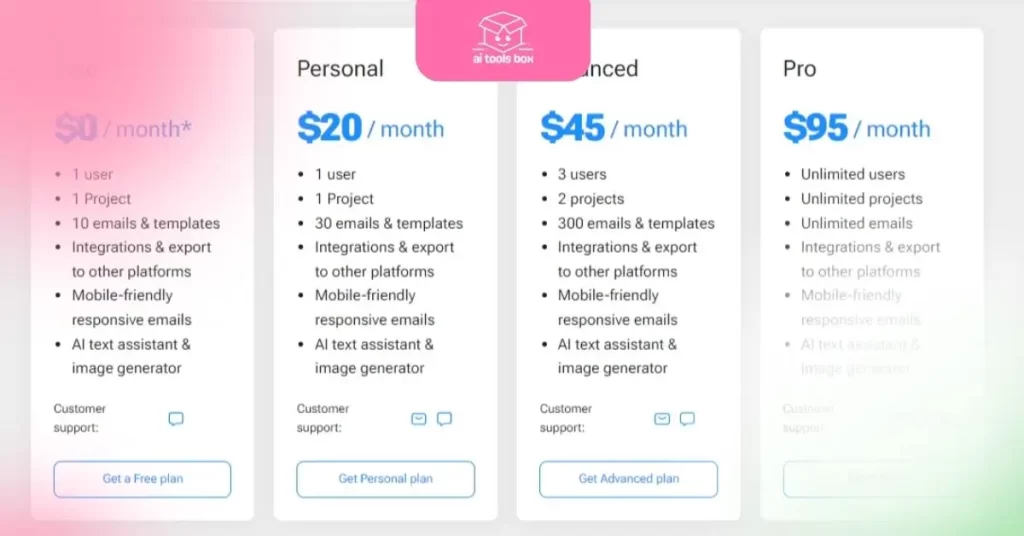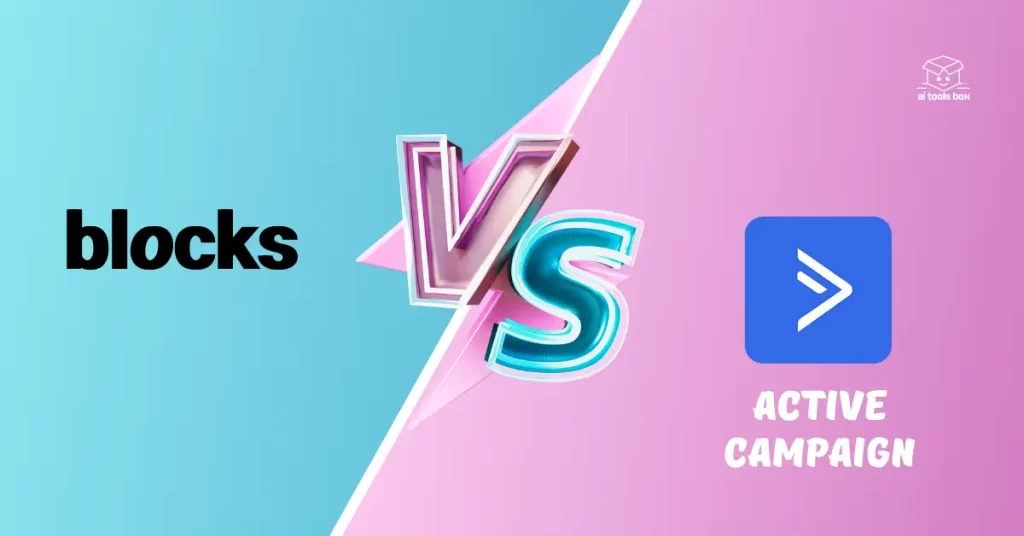In the fast-paced world of digital marketing, crafting engaging email campaigns is crucial. ActiveCampaign and Blocks stand out with their AI-powered solutions, but how do they compare? This article dives deep into their features, focusing on AI-driven email campaign creation, to help marketers make an informed choice.
Core Features and Functionality
In the realm of email marketing, the core features and functionality of the tools used can significantly impact the success of campaigns. The ability to create, customize, and optimize email content is crucial in today's digital marketing landscape. With AI playing an increasingly vital role, tools like ActiveCampaign's AI content generator and Blocks' AI-powered email builder are changing the game. They offer unique features that cater to different aspects of email campaign creation and management. We will compare these tools in terms of their core capabilities, user interface, integration options, and overall efficiency in streamlining email marketing efforts.
ActiveCampaign's AI Content Generation
ActiveCampaign leverages cutting-edge AI technology to simplify personalized customer engagement across various touchpoints. It allows marketers to ideate, compose, and refine content quickly, ensuring relevance and optimization for the customer's experience. The platform focuses on accelerating the writing process, turning keywords into refined content, and iterating based on feedback for improved marketing strategies.
Blocks' AI-Powered Email Building
Blocks offers a no-code solution, allowing users to create high-quality email templates without any coding knowledge. By simply inputting specifications, Blocks generates the code, reducing email development chaos and stress. It also features integration with over 100 platforms, including HubSpot and Marketo, enhancing its versatility for various industries like real estate, e-commerce, finance, insurance, and education.
Specific Product Comparisons
When it comes to selecting the right email marketing tool, understanding the nuances of each product becomes paramount. ActiveCampaign and Blocks, while both offering AI-driven solutions, have distinct approaches and features that cater to various aspects of email campaign management. We will aim to dissect these differences in greater detail.
ActiveCampaign: Fine-Tuning for Perfection
ActiveCampaign's AI content generator enables users to craft campaigns that resonate with their audience. It provides tools for testing content tone, structure, and intent, ensuring each campaign strikes the right chord with its audience.
Blocks: Ease of Use and Collaboration
Blocks emphasizes ease of use with its no-code approach and collaborative features. It allows teams to discuss project details and brainstorm ideas without leaving the platform, enhancing team coordination and efficiency.
By examining these specific features, we can better understand how each tool fits into different marketing workflows, catering to diverse business needs and technical proficiencies.
Performance and Reliability
In the world of email marketing, the performance and reliability of a tool are not just features—they are the backbone of successful campaigns. Let’s aim to benchmark ActiveCampaign and Blocks in these critical areas. We will evaluate how each tool stands up to the demands of high-volume email campaigns, their uptime records, and the consistency of their AI-driven outputs. By analyzing user reviews, expert opinions, and real-world use cases, we will provide a comprehensive comparison of their robustness and efficiency. Understanding these aspects is crucial for marketers who prioritize stability and effectiveness in their email marketing tools.
Active Campaign: Strategy Refinement for Results
ActiveCampaign encourages experimenting with content variants to identify what best resonates with customers, aiming to continuously improve personalized experiences.
- A Multifaceted Tool for Diverse Marketing Needs
ActiveCampaign, primarily recognized as an email marketing software, has evolved to offer a full CRM suite. It's widely used for various purposes, like maintaining email lists, automating weekly communications, and creating marketing funnels. Users employ ActiveCampaign for email communication with potential clients, monitoring activity, and automating campaigns. It's lauded for revolutionizing marketing efforts, enhancing campaign performance, and increasing efficiency with its automation capabilities. The software is used across different organizational departments, including marketing, sales, and customer support, making it a versatile tool in a corporate ecosystem.
However, it's important to note that some users find ActiveCampaign's user interface confusing and overwhelming, which could be a consideration for businesses seeking an intuitive platform.

Blocks: Responsiveness Across Devices
Blocks focuses on creating responsive emails that work seamlessly across multiple devices. This feature is crucial in today’s multi-device environment, ensuring a consistent user experience regardless of the viewing platform.
- Simplifying Email Design with a No-Code Approach
Blocks is recognized for its no-code, drag-and-drop email builder, designed to create responsive HTML emails efficiently. Its platform allows for collaboration, enabling team members to work together on projects. Blocks streamlines the email design and production process, saving time and resources. Users can choose from a range of templates or upload their own for customization. Unique features include the ability to restrict access to emails to prevent accidental deletion or editing and the generation of HTML emails that perform consistently across mobile and desktop platforms. Additionally, Blocks offers image editing capabilities and countdown timers to enhance campaign effectiveness.
In terms of licensing and deployment, Blocks is proprietary and cloud-hosted, providing 24×7 support through email, chat, and phone, along with training options like webinars and documentation. Its pricing model is usage-based, with options for monthly payments, annual subscriptions, and quote-based plans, and it also offers a free version.
These insights provide a comprehensive view of the performance and reliability aspects of both ActiveCampaign and Blocks, helping businesses assess which tool aligns best with their email marketing strategies.

Value for Money and Overall Recommendation
In today's competitive digital landscape, the value for money of a marketing tool is as crucial as its technical capabilities. We will delve into their pricing structures, features-to-price ratio, and overall value proposition to determine which tool offers the most beneficial investment for different types of businesses. Whether you're a small startup or a large enterprise, understanding the cost-effectiveness and strategic fit of these tools is vital to making an informed decision that aligns with your budget and marketing objectives.
Cost-Effectiveness and Target Audience Fit
When considering pricing, both platforms offer unique value propositions. ActiveCampaign excels in personalized content creation and strategic refinement, making it ideal for marketers focused on content-driven strategies. Blocks, with its no-code, user-friendly approach, is perfect for teams seeking simplicity and efficiency in email template creation.
Active Campaign: Flexible Pricing for Diverse Business Needs

ActiveCampaign offers various pricing tiers, catering to different business sizes and needs. Their plans include:
- Lite Plan: Starting at $29/month (billed annually) or $39/month (billed monthly), it's aimed at solopreneurs who need effortless marketing. It includes basic features like a 10x contact email send limit, suitable for individual marketers or small operations.
- Plus Plan: Starting at $49/month (billed annually) or $70/month (billed monthly), this plan targets small teams focused on crafting excellent experiences across the customer lifecycle. It accommodates up to three users, making it ideal for small businesses or growing startups.
- Professional Plan: Starting at $149/month (billed annually) or $187/month (billed monthly), this plan is designed for teams looking to experiment and optimize marketing efforts, offering advanced features for mid-sized businesses.
- Enterprise Plan: This plan is customizable and targets larger organizations looking to personalize marketing at scale. It offers advanced features and a higher contact email send limit, catering to large enterprises with extensive marketing needs.
Blocks: No-Code Solution with Varied Pricing Options
Blocks, known for its no-code email builder, offers a range of pricing options:
- Free Version: Offers basic capabilities like 1 user, 1 project, 10 emails and templates, integration and export to other platforms, and an AI text assistant and image generator.
- Personal Plan: Priced at $16/month (billed monthly) or $20/month, it includes 1 user, 1 project, 30 emails and templates, and similar features as the free version, targeting individual users or freelancers.
- Advanced Plan: At $37/month (billed monthly) or $45/month, this plan includes 3 users, 2 projects, 300 emails, and templates, making it suitable for small teams or businesses that require more collaborative features.
- Pro Plan: Priced at $79/month (billed monthly) or $95/month, it offers unlimited users, projects, and emails, catering to larger businesses or agencies that need extensive email marketing capabilities.

ActiveCampaign offers a more traditional tiered pricing model, scaling up with business size and marketing complexity, making it suitable for a range of businesses, from solopreneurs to large enterprises. Blocks, with its no-code approach, presents a straightforward and accessible solution for users at various levels, from individuals to professional teams, emphasizing ease of use and collaboration. The choice between ActiveCampaign and Blocks should be based on the specific needs of your business, the size of your team, and the complexity of your email marketing campaigns.
Both ActiveCampaign and Blocks offer compelling AI-powered solutions for email campaign creation. ActiveCampaign stands out for marketers seeking deep content personalization and strategic refinement, while Blocks is the go-to for those prioritizing ease of use and responsiveness across devices. Your choice should align with your specific needs, budget, and marketing strategy.
Explore these platforms further to discover which aligns best with your email marketing goals.



